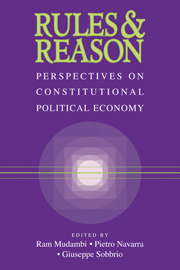Book contents
- Frontmatter
- Contents
- Foreword
- Preface and Acknowledgments
- List of Contributors
- 1 Constitutional Issues in Modern Democracies
- PART I CONSTITUTIONAL THEORY
- PART II ELECTORAL SYSTEMS AND INSTITUTIONS
- PART III CONSTITUTIONAL ISSUES FOR A FEDERAL STATE
- 12 Ensuring a Stable Federal State: Economics or Political Institutional Design
- 13 A Proposal for Dynamic European Federalism: FOCJ
- 14 The Maastricht “Excessive Deficit” Rules and Creative Accounting
- 15 Subsidiarity, Federalism, and Direct Democracy as Basic Elements of a Federal European Constitution: Some Ideas Using Constitutional Economics
- Index
12 - Ensuring a Stable Federal State: Economics or Political Institutional Design
Published online by Cambridge University Press: 05 June 2012
- Frontmatter
- Contents
- Foreword
- Preface and Acknowledgments
- List of Contributors
- 1 Constitutional Issues in Modern Democracies
- PART I CONSTITUTIONAL THEORY
- PART II ELECTORAL SYSTEMS AND INSTITUTIONS
- PART III CONSTITUTIONAL ISSUES FOR A FEDERAL STATE
- 12 Ensuring a Stable Federal State: Economics or Political Institutional Design
- 13 A Proposal for Dynamic European Federalism: FOCJ
- 14 The Maastricht “Excessive Deficit” Rules and Creative Accounting
- 15 Subsidiarity, Federalism, and Direct Democracy as Basic Elements of a Federal European Constitution: Some Ideas Using Constitutional Economics
- Index
Summary
Federalism is often seen as a partial solution to an array of problems that confound stability and economic growth in democratic states. For continental powers like the United States, Russia, and Australia, the goal is to encourage a rational treatment of public goods and externalities that vary in geographic scope. Federalism in Germany was identified as a way to decentralize power in accord with earlier traditions and to minimize the likelihood that a dictatorship could again subvert its constitutional order. Federalism in India seems the only way to govern a heterogeneous state that will soon be the most populous on the planet. Federal institutions in Russia are essential not only because of geographic diversity and the desire to break with the previous regime's practices of over-centralization, but also to make coherent a situation in which regional authorities cannot be precluded from asserting their autonomy against a weakened central government. And federalism in one form or another is regarded as the only structure that might contend successfully with the ethnic, religious, and linguistic cleavages that bedevil countries like Spain, Ukraine, Nigeria, Belgium, South Africa, and Canada. In fact, it is now commonly agreed that there should be some federal-like decentralization of governmental authority and responsibility even for states that are not explicitly or implicitly federal.
Federalism, though, is not a notably successful governmental form. The ultimate character of American federalism, especially the legitimacy of the supremacy of federal over state law, was determined only through a civil war.
- Type
- Chapter
- Information
- Rules and ReasonPerspectives on Constitutional Political Economy, pp. 207 - 236Publisher: Cambridge University PressPrint publication year: 2001
- 1
- Cited by

